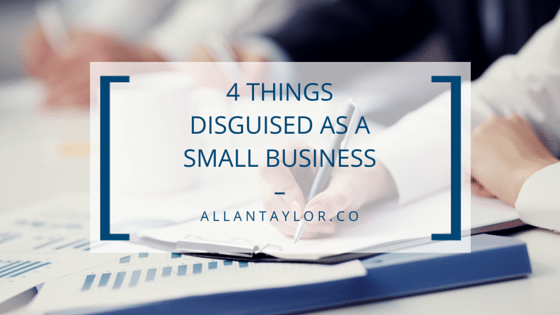I take pride in saying, “I’m a small business owner”. But if I’m honest with myself, there have been times over the years when I’ve actually been in disguise. Barbara Taylor gives us a great look at four things that masquerade as a small businesses. Why does it matter? Selling a small business is challenging, but selling something disguised as a small business can be almost impossible. It’s important to know the difference.

Depending how you define the term “small business” — and there is plenty of disagreement — there are lots of things parading around as a business that really aren’t. These creatures may have all the external trappings of a business venture, but at their heart they are something else. My (admittedly biased) definition of a real business includes being a successful enterprise that has transferable value, and could be sold to either an internal or external buyer.
With millions of small businesses out there, it can be hard to spot the imposters. Here are four characters — from the benign and charming to the truly terrifying — that look like a business on the surface, but may be something else behind the mask:

A Job
The job-disguised-as-a-business is so common that it goes virtually unnoticed. This business is the Halloween equivalent of Charlie Brown wearing a sheet with two holes for a ghost costume. Based on numbers from the U.S. Census Bureau, about 75 percent of the 28 million or so small businesses out there are self-employed with no additional payroll.
Common characteristics:
- Few to no employees
- Daily operations are wholly dependent on the owner
- Customers do business with the owner, not the business
- Self-funded through personal savings or organic growth
The trouble with this disguise is that the owner forgets they are wearing it. Many of these businesses could be taken to the next level with a bit of capital, a few key hires and a focused plan for growth. Alas, this character is often too timid or too complacent to turn the business from a paycheck to an asset for wealth creation.
The biggest regret this owner may have is playing too small.

A Hobby
Don’t be fooled! The hobby-disguised-as-a-business can look quite real on the surface. This business often has a cool brand name, a catchy URL, nice packaging and a website with a shopping cart. It may even have a business plan. The hobby is often a great idea for a product or service that truly has merit. It gets initial “oo’s” and “ah’s,”and tempts you to take a closer look.
Common characteristics:
- Passionate founder (with a day job or bread-winning spouse)
- Little to no sales revenue or established customer base
- Little to no funding. Often in search of “the right partner.”
- Lacks key functional areas (supply chain, distribution, finance, etc.)
- Overly focused on future potential
The trouble with this costume is that the owner never really figures out how to wear it. The hobby business is a sideline at best. This owner lives in the world of what could be, rather than rolling up their sleeves, doing the work and taking the risk to make their vision a reality.
The biggest regret this owner may have is never going for it.

An ATM machine
This business can be a real head-turner with impressive top line revenues and brand recognition. On the surface the ATM-disguised-as-a-business looks like a dream to own. In the wrong hands, however, this business can quickly go from a cash cow to a nightmare.
Common characteristics:
- Owner prioritizes personal gain over business metrics
- Disorganized operations with well-paid employees
- Missed opportunities for growth
- Little to no reinvestment in the business
- Lack of financial controls
Like too much candy on Halloween, some ATM owners get a sugar-high from all the dollars swirling around their heads. These owners often get swept up in the usual frenzy of conspicuous consumption and lulled into a false sense of security that the money will always be there. Until it isn’t.
Ironically, the biggest regret this owner may have is decimating their personal finances.

A Trick
Beware! This business is an elusive creature that can take many forms. Like the costumes listed above the trick-disguised-as-a-business may seem wildly successful, but deception lurks just beneath the surface.
Common characteristics:
- A long string of fired accountants and advisors
- Loyal but unsophisticated internal bookkeeper
- Financial statements that raise more questions than they answer
- Owner who manages through fear or manipulation
Unlike most business owners who do their best to minimize taxes within acceptable limits, Tricksters are willing to push the envelope beyond reason. Like the ATM machine, this business is usually operating on borrowed time. The owner may even be delusional enough to think that they can sell the business to an unwitting buyer. Disappointment ensues as the Trickster quickly turns into The Emperor Has No Clothes.
The biggest regrets this owner may have range from huge fines and back taxes to personal bankruptcy or a new costume altogether: the orange jumpsuit.

Author: Barbara Taylor
Barbara is co-founder of Allan Taylor & Co. and a former New York Times blogger. She has been a small-business owner since 2003. Barbara lives with her husband, Chris, and their two sons in Northwest Arkansas.